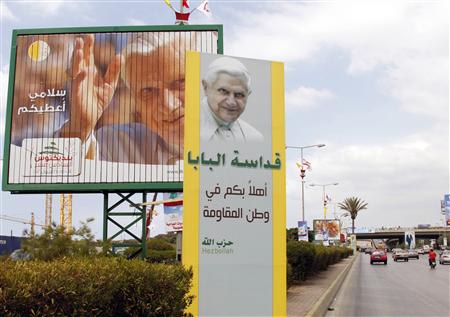 Pope Benedict arrives in Lebanon on Friday to bring a message of peace to a region torn by civil war in neighboring Syria and strained by violent Islamist protests against the United States in Libya and Egypt.
Pope Benedict arrives in Lebanon on Friday to bring a message of peace to a region torn by civil war in neighboring Syria and strained by violent Islamist protests against the United States in Libya and Egypt.
While those tensions overshadowed preparations for the religiously sensitive visit, security was low-key in Beirut and the only protests - against a film denigrating the Muslim Prophet Mohammad - were due to take place far from the capital.
Even the militant Shi'ite movement Hezbollah has hung banners along the airport highway greeting Benedict with a picture of him and texts in Arabic and French saying: "Hezbollah welcomes the pope in the homeland of coexistence".
Nearby, the movement - which Israel and the United States consider a terrorist group - put up Arabic-only banners for local consumption with a different message: "Welcome to you in the homeland of resistance."
In Christian districts of the capital, pictures of the 85-year-old pope were plastered in every street and church bells rang out on Friday morning.
"The pope is with us," was the headline in Al-Nahar newspaper, which said more than 5,000 military and security personnel were being deployed to protect the pontiff. Beirut airport was due to close to all air traffic for two hours shortly before his arrival at 1.45 pm (0645 EDT).
Beirut-based Samir Khalil Samir, a leading Catholic expert on Islam, did not expect major security problems despite anti-U.S. protests in Libya, Egypt and Yemen because he said all Lebanese communities saw the trip as a gesture of peace.
"He will bring a spiritual message - one with political consequences, of course, but spiritual," he told Reuters.
Benedict, on his fourth trip to the Middle East as pope, will stress unity among the different Christian churches in the region and peace between Christians and Muslims during the visit, which will be restricted to Beirut and its surroundings and end on Sunday.
CHRISTIAN POPULATION
He will also urge Christians not to leave the Middle East, the birthplace of the faith that they have been steadily abandoning in recent decades to escape wars, political unrest and discrimination by the region's majority Muslims.
On Friday, Benedict will issue a document along these lines known as an "apostolic exhortation", based on discussions among Catholic bishops at a Rome synod on the Middle East in 2010.
He will also hold two major open-air events and meet leaders of all Lebanon's many Christian and Islamic communities, as well as the country's political leaders.
Christians now make up about five percent of the Middle Eastern population, down from 20 percent a century ago. If current pressures and their low birth rates continue, some estimates say their 12 million total could be halved by 2020.
The pope's message of peace will especially be aimed toward Syria, whose border is only 50 km (30 miles) away and where an opposition group says more than 27,000 people have been killed in an uprising against President Bashar al-Assad.
Clashes have occasionally spilled over into Lebanese territory, evoking fears of further fighting in a country still recovering from the sectarian civil war that raged from 1975 until 1990.
Tensions have been rising between Lebanon's Sunni Muslims, who generally back the uprising led by Syria's Sunni majority, and Shi'ites who usually support Assad's minority Alawite sect, an offshoot of Shi'ite Islam.
About two-thirds of Lebanon's Christians are in full communion with the Vatican, either as members of the five local churches linked to Rome - the Maronites, the largest group, and the Greek Melkite, Armenian, Syriac and Chaldean Catholics - or of the worldwide Roman Catholic Church itself.
There are also five Orthodox churches - the Greek, Armenian, Syriac, Assyrian and Coptic Orthodox - and small groups of Protestants, mostly Presbyterians and Anglicans.
No comments:
Post a Comment